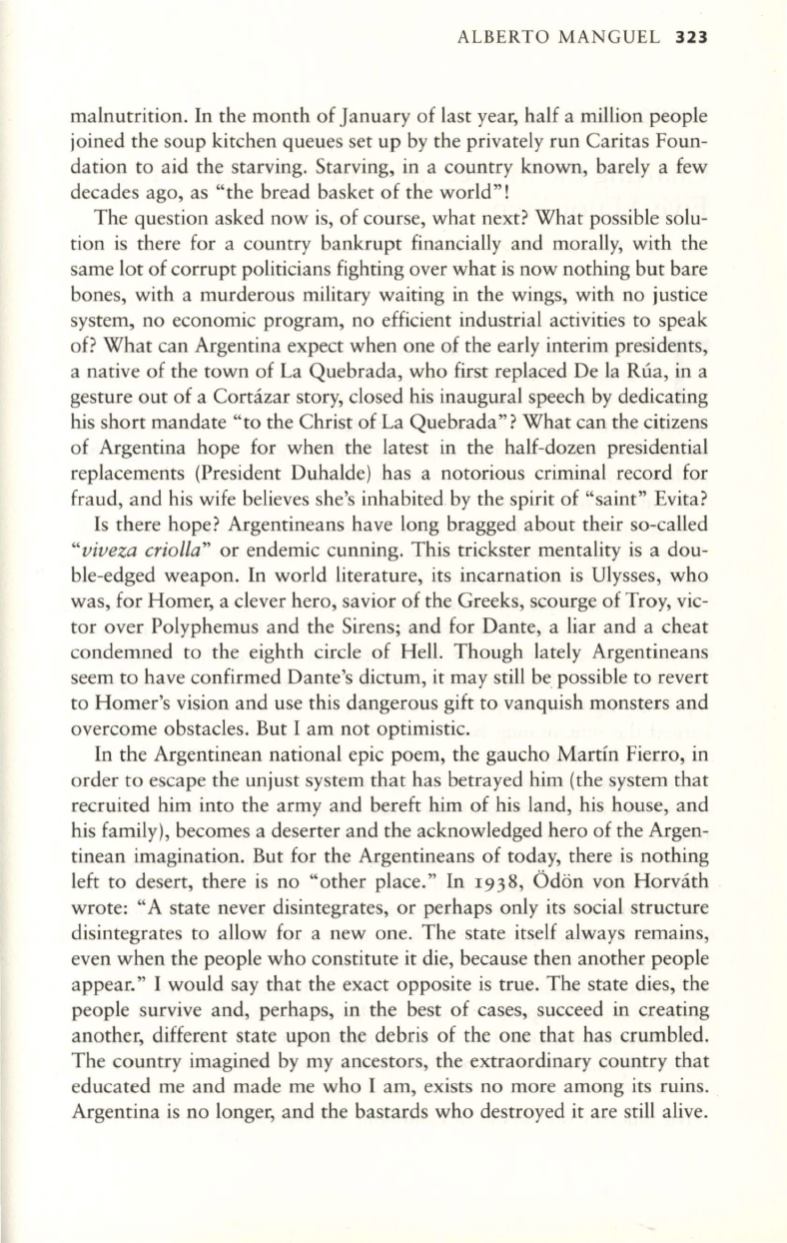
ALBERTO MANGUEL
323
malnutrition. In the month of January of last year, half a million people
joined the soup kitchen queues set up by the privately run Caritas Foun–
dation to aid the starving. Starving, in a country known, barely a few
decades ago, as "the bread basket of the world"!
The question asked now is, of course, what next? What possible solu–
tion is there for a country bankrupt financially and morally, with the
same lot of corrupt politicians fighting over what is now nothing but bare
bones, with a murderous military waiting in the wings, with no justice
system, no economic program, no efficient industrial activities to speak
of? What can Argentina expect when one of the early interim presidents,
a native of the town of La Quebrada, who first replaced De la Rua, in a
gesture out of a Cortazar story, closed his inaugural speech by dedicating
his short mandate "to the Christ of La Quebrada"? What can the citizens
of Argentina hope for when the latest in the half-dozen presidential
replacements (President Duhalde) has a notorious criminal record for
fraud, and his wife believes she's inhabited by the spirit of "saint" Evita?
Is there hope? Argentineans have long bragged about their so-called
"viveza criolla"
or endemic cunning. This trickster mentality is a dou–
ble-edged weapon. In world literature, its incarnation is Ulysses, who
was, for Homer, a clever hero, savior of the Greeks, scourge of Troy, vic–
tor over Polyphemus and the Sirens; and for Dante, a liar and a cheat
condemned to the eighth circle of Hell. Though lately Argentineans
seem to have confirmed Dante's dictum, it may still be possible to revert
to Homer's vision and use this dangerous gift to vanquish monsters and
overcome obstacles. But I am not optimistic.
In the Argentinean national epic poem, the gaucho Martin Fierro, in
order to escape the unjust system that has betrayed him (the system that
recruited him into the army and bereft him of his land, his house, and
his family), becomes a deserter and the acknowledged hero of the Argen–
tinean imagination. But for the Argentineans of today, there is nothing
left to desert, there is no "other place." In
1938,
Odon von Horvath
wrote: "A state never disintegrates, or perhaps only its social structure
disintegrates to allow for a new one. The state itself always remains,
even when the people who constitute it die, because then another people
appear." I would say that the exact opposite is true. The state dies, the
people survive and, perhaps, in the best of cases, succeed in creating
another, different state upon the debris of the one that has crumbled.
The country imagined by my ancestors, the extraordinary country that
educated me and made me who I am, exists no more among its ruins.
Argentina is no longer, and the bastards who destroyed it are still alive.


